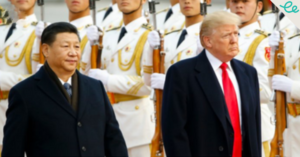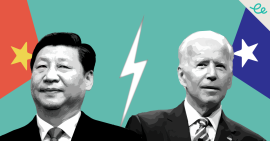The many challenges troubling US China relations stayed firmly in the news as the USA transited from the Donald Trump to the Joe Biden era. In its final days, the Trump administration did nothing to ease US China tensions, rather they raced to increase the pressure on Beijing. While Beijing may hope for a softer approach from the new president, his secretary of state nominee, Antony Blinken, said Trump’s tough approach to China was right but the tactics were wrong. This article is a summary of important US China news in January 2020.
Blinken said he favoured cooperation with China on climate change and other issues, but reiterated that genocide had been committed against Uighur Muslims. John Kerry pledged that the White House would not make unsavoury concessions to China in exchange for climate progress. “China is a strategic adversary,” said US ambassador to the UN nominee Linda Thomas-Greenfield.
Treating China as a “strategic rival” is a misjudgement that could lead to mistakes, countered Chinese ambassador Cui Tiankai. Vice-minister of foreign affairs Le Yucheng called on Washington to take immediate action to repair relations with Beijing, and slammed Trump’s China policy as an “utter failure”. The USA is in a serious competition with China, and Biden wants to approach relations with Beijing with “patience”, explained White House spokeswoman Jen Psaki.
Earlier, a Chinese foreign ministry spokeswoman said the US-China relationship can be restored and “kind angels can triumph over evil forces”. Yet just as Joe Biden made his presidential oath, Beijing announced a China travel and business ban on 28 US officials, including Mike Pompeo and their family members. That sanction was “unproductive and cynical”, replied a spokeswoman for Biden’s National Security Council.
Pompeo declared that China had committed “genocide and crimes against humanity” against Uighur Muslims in Xinjiang. Other last minute Trump administration actions included an executive order to assess security risks from Chinese-made drones, and a push to minimise government procurement of Chinese goods and services. Janet Yellen, treasury secretary nominee, said the Biden administration would “take on China’s abusive, unfair and illegal practices”.
In its final days, the Trump administration placed new restrictions on Chinese companies, adding CNOOC and Xiaomi to government blacklists, and gave the federal government more power to block technology imports. But it scrapped plans to blacklist Chinese tech giants Alibaba, Tencent and Baidu. Beijing moved to hit back at US sanctions with new rules countering “unjustified” laws and restrictions imposed by foreign countries on Chinese companies and citizens.
Mike Pompeo lifted longstanding restrictions that limit US diplomatic relations with Taiwan and called Taiwan “a reliable partner and vibrant democracy that has flourished despite Beijing’s efforts”. On January 23, the Biden administration called on Beijing to stop its intimidation of Taiwan. On the same day, Chinese military aircraft simulated missile attacks on a nearby US aircraft carrier during an incursion into Taiwan’s air defence zone, the FT reported.
The Trump-led chaos at the US Capitol lent Chinese officials and state media the perfect opportunity to mock US hypocrisy. His administration kept up efforts to punish Beijing: a move to ban transactions with eight Chinese apps including Alibaba’s Alipay, WeChat Pay and Tencent’s QQ Wallet, for threatening national security, and possibly adding Alibaba and Tencent to a blacklist of firms connected to the Chinese military. The NYSE planned to proceed with delisting China’s three main telecoms companies, another security threat.









Comments are closed.